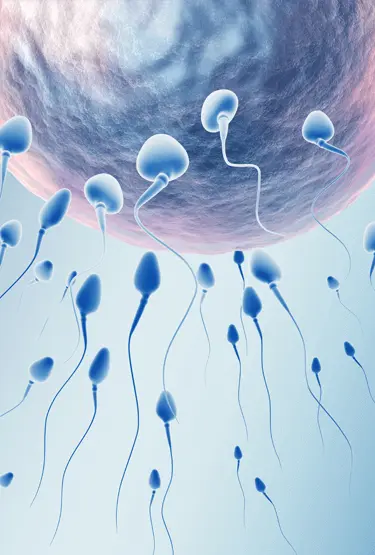Male Infertility Solutions: Medical Treatments Explained
Infertility can occur in both males and females, affecting about 1 in 6 people around the globe. It refers to the inability to conceive after at least one year of having sex without a form of birth control. And while both males and females can have problems that contribute to infertility, nearly one-fifth of infertility cases are attributable solely to the male.
Keep reading to learn about the basics of infertility in males, when you should seek professional assistance and how Fertility Cloud can help.
Common symptoms of male infertility
There are quite a few potential signs of infertility in males that you should be on the lookout for. While some symptoms of infertility in males revolve around sexual performance, others are physical symptoms that pertain to illness or the body’s appearance.
Common symptoms of male infertility include:
- Decreased amount of ejaculate.
- Low sperm count.
- Reduced sexual desire.
- Erectile dysfunction.
- Pain or swelling in or around the testicles.
- Breast growth (gynecomastia).
- Decreased body or facial hair.
- Recurrent respiratory infections.

Possible causes of male infertility
There’s a long list of potential causes connected to male infertility. They can stem from many facets, possibly in ways that you wouldn't expect.
The possible causes of infertility in males can range from medical reasons to environmental causes, as well as lifestyle habits. But knowing potential causes can also help you learn about steps for prevention by knowing what to avoid. Below are some of the most common male infertility symptoms in each category.
Medical causes of male infertility:
- Varicocele — This refers to swollen veins that are meant to empty the testicle.
- Infections — STDs including gonorrhea or HIV, or infections like inflamed testicles, can cause scarring that interferes with the sperm’s passage.
- Antibodies — There are immune system cells that attempt to eliminate sperm if they are confused for harmful invaders.
- Undescended testicles — It’s possible that one or both testicles don’t descend into the scrotum during puberty.
- Hormone imbalances — If the hypothalamus, pituitary, thyroid or adrenal glands don’t function correctly, they can cause low testosterone levels.
Environmental causes of male infertility:
- Exposure to industrial chemicals (e.g., pesticides, herbicides, paint).
- Exposure to heavy metal or lead.
- X-rays or radiation.
- Continuous exposure to high heat.
Lifestyle factors of male infertility:
- Excessive alcohol consumption.
- Anabolic steroid use.
- Obesity.
- Smoking tobacco.

By knowing about the potential causes of infertility in males, you can know what to avoid or change in your day-to-day life, such as decreasing the amount of alcohol you consume or wearing the proper equipment to avoid fumes around industrial chemicals.
When should you seek help for male infertility?
Since infertility is defined as the inability to conceive after one year of unprotected sex, you should seek help for potential male infertility after those 365 days. Professional medical assistance with infertility in males can include a physical exam as well as checking your sperm for abnormalities.
There are a few sperm characteristics that may reduce the chance of egg fertilization, including:
- Low motility (movement).
- Improper function.
- Low sperm count in semen (less than 15 million sperm per milliliter of semen).
- Lack of hormone production needed for healthy sperm.
It’s important to remember that if you want to know your sperm count, a sperm analysis can be done at any time by your doctor, even before trying to conceive. Here are a few other potential tests that a doctor may recommend, and what they check for:

- Hormone testing — Hormone imbalances that could affect sperm production.
- Genetic testing — Genetic abnormalities that could affect fertility.
- Imaging testing — Abnormalities in the reproductive system.
- Testicular biopsy — Potential causes of infertility by removing a piece of testicle tissue to be examined under a microscope.
How Fertility Cloud can help with male infertility
Infertility can be frustrating and upsetting, but you shouldn’t lose hope. If you’re struggling with infertility as a male, it’s important to know the next steps to take to increase your chances of conceiving. That’s where we come in.
Our fertility specialists can help with infertility in males in a variety of ways. After a virtual consultation and in-home testing, they can determine the best medications needed to help increase your fertility. We can even have the prescriptions sent straight to your door.
Then your specialist can identify the best possible options to increase the chance of conception for you and your partner, which may include:
- Treatment to increase sperm count and balance out hormones.
- Surgery.
- In vitro fertilization (IVF).
- Intracytoplasmic sperm injection (ICSI).
If you’re ready to get help with infertility as a male, contact our team by phone today for more information or book an initial appointment online with a fertility specialist.